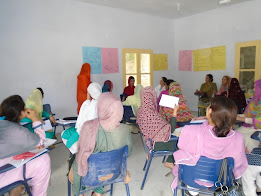Professional learning communities may be sustained for
a long period of time on the basis of essential principles of effective
functioning. The suggested principles to sustain communities are; depth and
breadth, stability and change, diversity and focus, and networking and integration
(Louis, 2008).
Depth and breadth
The members need to work freely on tasks over a long
period of time. Louis suggested that the
members while working in collaborative teams need to be able to deal with new
dilemmas, involve new members with enthusiasm, and increase their focus on meeting
arising needs. Self-assessment, support from critical friends, persistent work, and responsive adaptation should be continued. As Dufour (2004) said that
complications and problems are unavoidable because those are the products of the change process. The members need to accept and address dilemmas and problems
that may lead to working on tasks for a longer period of time.
Stability and change
The productivity of teams depends upon stability in
team efforts and relationships. Kruse and Louis ( as cited in Louis, 2008)
stated that the mobilization of the team and administrative decisions create
situations where the members spend more time building trust with new members
rather than focusing on work. Stable teams being cohesive may work for planning
and change within the professional learning community.
Diversity and focus
Diversity and focus is another way of sustaining
professional learning communities in which teams are formed by members with
diverse abilities and experiences. Teams with members of alike-thinking focus
more on work because trust is built easily. According to the findings of
research conducted by Bolam, Stoll, and Greenwood (as cited in Louis, 2008),
groups comprised of members with diverse
opinions and backgrounds lead to effective problem finding and problem-solving
over a period of time. The balance between groups involving diversity and
role-alike groups needs to be created within a learning community.
Networking and integration
The equilibrium between the internal environment which
involves the productivity of collaborative teams and the influences of the external
environment which involve demands of the society is important to sustain
learning communities.
Bolam et al. (2005) discussed
that external and internal contextual factors of a professional learning
community are complex and dynamic to be controlled using both the opportunities
and the limitations of a staffs’ capacities. The
terms namely focus on professionalism and focus on community as used by Louis
(2008) for external influences and internal productivity of teams respectively.
Excessive professionalism is the influence of external elements such as diversity,
breadth, networking, and change while community involves a focus on work, depth,
integration, and stability. Excessive professionalism leads to disintegration in
professional learning communities and reinforces a tradition of members as
self-ruling individuals. Focus on community leads to self-satisfied teams in
which challenges may not be created. Equilibrium between focusing on
professionalism and focusing on a community is necessary for sustaining professional
learning communities.


Professional learning communities thrive on depth, stability, diversity, and balance between internal and external factors. We aim to uphold these values and contribute to quality education in Pakistan. My institute in Lahore, offers the best Graphic Design and Video Editing Course. We focus on practical skills. For best courses in Lahore visit our Institute the name is Nisda.
ReplyDelete